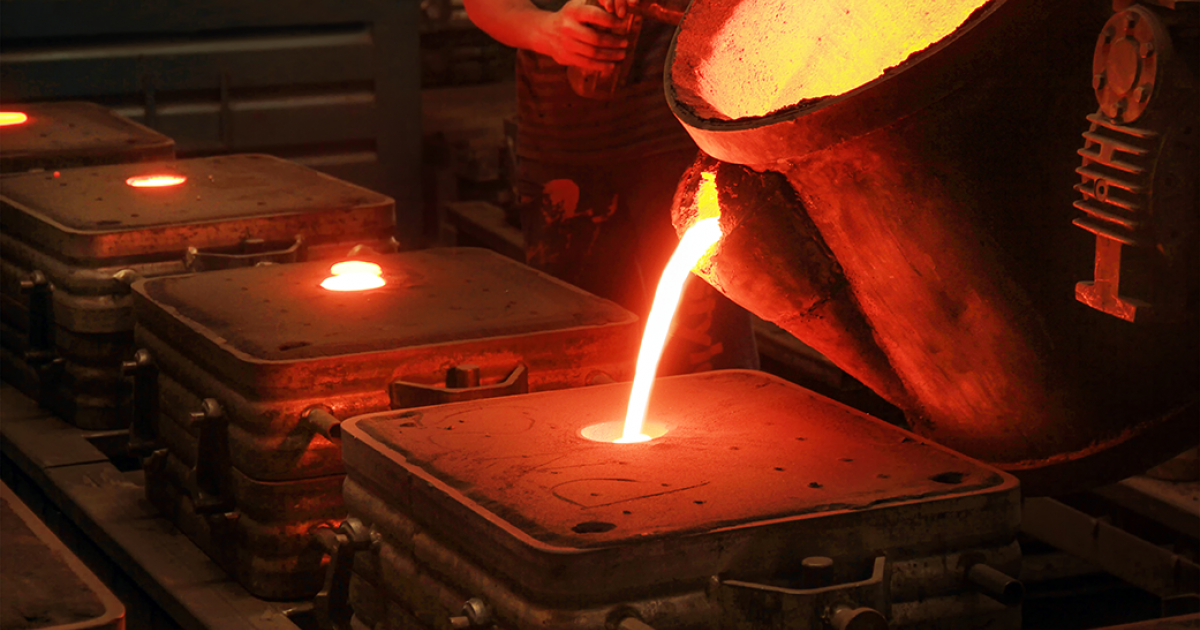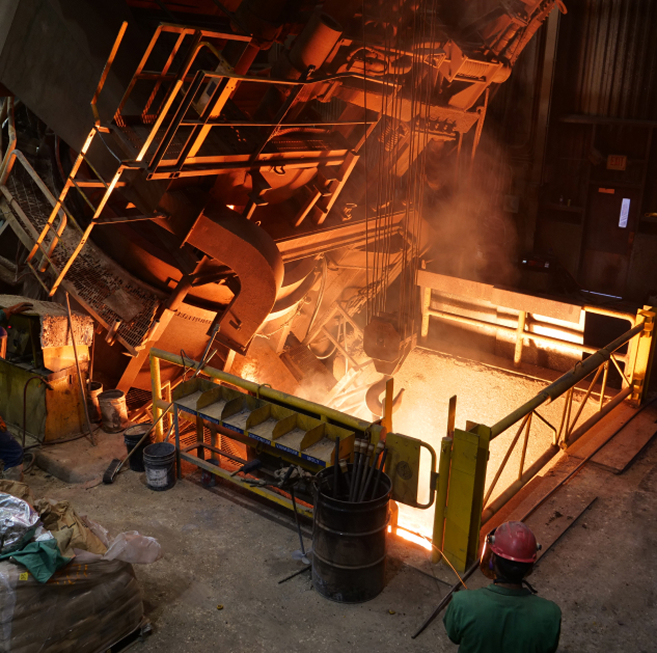Essential Insights into How a Metal Foundry Creates Durable Metal Components
Wiki Article
A Comprehensive Guide to Metal Casting: Benefits and Services Used by Foundries
Metal casting is a vital procedure in different sectors, providing countless benefits via the services of shops. These facilities change liquified metal into sturdy and accurate parts, accommodating details client demands. By employing innovative innovations, factories ensure top quality and performance in manufacturing. The details of metal casting and the diverse strategies entailed elevate crucial concerns concerning its function in modern production. What developments exist in advance in this important area?Recognizing the Metal Casting Process
The metal casting procedure is a basic strategy utilized in manufacturing to produce intricate shapes and elements. This method includes putting liquified metal right into a mold and mildew designed to form the desired things. The process begins with pattern production, which works as a template for the mold and mildew. Aluminum Casting. Numerous products, such as sand, metal, or ceramic, are used for mold-making, depending upon the specific requirements of the casting
As soon as the mold and mildew is prepared, molten metal is poured right into it and permitted to solidify and cool. After solidification, the mold is gotten rid of, disclosing the cast component. Numerous techniques, consisting of sand casting, investment casting, and pass away casting, are utilized, each fit to different applications and products. Quality assurance procedures, such as examinations and screening, are important to guarantee the last item satisfies specs. In general, the metal casting process plays an essential duty in creating parts for industries varying from auto to aerospace.
Key Conveniences of Metal Casting
Metal casting uses significant benefits that make it a preferred production method in numerous markets. Its design versatility and accuracy allow for detailed shapes, while economical automation improves efficiency. Furthermore, the convenience and strength of materials made use of in casting contribute to the longevity of the final products.Layout Flexibility and Accuracy
Releasing amazing layout flexibility and accuracy, metal casting permits designers and engineers to develop elaborate forms and features that would certainly be tough or impossible to achieve with other making methods. This ability allows the manufacturing of complicated geometries, internal frameworks, and fine details that boost product capability and looks. Additionally, different casting techniques, such as sand casting, investment casting, and pass away casting, provide additional alternatives for personalization, suiting varied product residential properties and task requirements. The adaptability of molds permits adjustments throughout the design phase, enhancing the change from principle to last product. Ultimately, metal casting stands apart for its capability to provide high-precision elements, making it a very useful process in industries ranging from automobile to aerospace and beyond.Cost-efficient Automation
Cost-efficient mass manufacturing stands as one of the primary benefits of metal casting, making it possible for manufacturers to generate big quantities of parts at a reduced cost each. This effectiveness develops from the ability to develop elaborate molds that can be recycled several times, significantly lowering arrangement and functional costs. Furthermore, metal casting processes, such as sand casting and die casting, permit high throughput, making it feasible to fulfill the needs of massive manufacturing runs. The minimized material waste and power usage further boost expense savings, making metal casting an attractive alternative for markets needing mass elements. In general, the affordable nature of metal casting positions it as a recommended method for suppliers intending for economic performance in their manufacturing procedures.Material Flexibility and Stamina
Among the standout qualities of metal casting is its remarkable product flexibility, which permits the use of a wide variety of alloys and metals. This versatility makes it possible for producers to pick products that best fit their details applications, from aluminum and bronze to iron and steel. Each metal uses one-of-a-kind buildings, including differing degrees of strength, rust resistance, and thermal conductivity. Metal casting can produce components that satisfy rigorous efficiency needs throughout diverse industries, such as automobile, aerospace, and building. Furthermore, the toughness of actors metals can be improved with different therapy procedures, making certain resilience and durability. Metal Casting. Generally, the combination of material adaptability and intrinsic stamina makes metal casting a favored option for generating high-grade partsKinds Of Metal Casting Strategies
Metal casting incorporates a selection of strategies that satisfy various production requirements and material residential properties. Usual approaches consist of sand casting, which makes use of a sand mold and mildew for intricate shapes, and investment casting, known for its precision and surface area coating. Pass away casting is one more strategy that utilizes high-pressure injection of molten metal into molds, ideal for mass production of tiny components.Covering molding provides a quicker different, utilizing a resin-coated sand to produce thin-walled molds, while lost foam casting permits elaborate designs without the need for a core.
Furthermore, constant casting is used for generating long sections of metal, such as sheets or bars, by solidifying liquified metal in a constant process. Each technique offers unique advantages and is chosen based upon aspects like the called for detail, manufacturing quantity, and product kind, guaranteeing superior results in metal fabrication throughout various markets.
The Role of Foundries in Metal Casting
Factories play a critical duty in the metal casting process, acting as the centers where molten metal is changed right into completed items. These specialized facilities are equipped with the necessary devices and modern technologies to handle different metals, making certain premium end results. Foundries are accountable for numerous vital features, consisting of melting the metal, pouring it into mold and mildews, and permitting it to strengthen.Additionally, they preserve strict security and ecological criteria to protect workers and reduce environmental effect. Skilled specialists and engineers work together to enhance casting processes, boosting efficiency and minimizing waste. Shops likewise take part in high quality control actions, making sure that the end products satisfy certain resistances and specs. This high quality assurance is necessary for sectors that count on specific parts, such as auto and aerospace. As a result, foundries contribute considerably to the overall manufacturing landscape, making it possible for innovation and growth throughout numerous sectors.
Custom Metal Casting Services
Custom metal casting solutions supply customized style options that fulfill details customer demands. These services also provide material option expertise, ensuring the right metal is selected for the preferred application. Such flexibility and knowledge boost the total high quality and performance of the end product.
Customized Design Solutions
Tailored style remedies in metal casting provide makers with the adaptability to develop components that meet particular efficiency and visual requirements. Shops offer customized services that enable clients to define measurements, shapes, and surface area coatings to accomplish wanted end results. This customization you could check here process frequently includes partnership between engineers and designers, guaranteeing that the end products align with functional demands and sector criteria. Advanced modern technologies, such as computer-aided layout (CAD) and simulation software program, enable specific modeling and testing of components before production, boosting and decreasing mistakes effectiveness. By leveraging customized layout remedies, organizations can maximize performance while decreasing waste and costs, ultimately bring about an extra affordable edge in the market. This adaptability is essential for sectors needing distinct applications and specifications.Product Choice Competence
When choosing materials for metal casting, experience plays a crucial function in guaranteeing that the appropriate option aligns with both efficiency demands and cost-effectiveness. Shops utilize experienced specialists who recognize the residential or commercial properties of various steels and alloys, enabling them to suggest perfect products for particular applications. Factors such as stamina, corrosion resistance, and thermal conductivity are meticulously thought about to meet the customer's requirements. Additionally, sector patterns and advancements in product science notify these choices, allowing shops to stay affordable. By leveraging their knowledge, shops can assist clients in guiding through complicated product options, eventually leading to enhanced item quality and decreased manufacturing costs. This specific expertise is vital for attaining successful results in custom metal casting services.Quality Control in Metal Casting
Quality assurance in metal casting is essential to assure that the end products meet the needed requirements and performance criteria. Foundries utilize a variety of methods and methodologies to assure the best quality of cast elements. This procedure begins with rigid product evaluations, confirming that basic materials abide by industry requirements. Throughout the casting procedure, real-time monitoring and testing are carried out to analyze parameters such as temperature level, mold and mildew stability, and dimensional precision.
Applications of Metal Castings Across Industries
Metal castings play a critical role in different sectors, acting as the backbone for many applications. In the automotive industry, cast elements such as engine blocks and transmission real estates are necessary for car performance and integrity. The aerospace sector counts on precision castings for important parts that assure safety and efficiency in flight. Additionally, the building market makes use of metal castings for best site fixtures, installations, and architectural elements, enhancing the sturdiness of structures and facilities.In addition, the power field take advantage of spreadings utilized in wind turbine blades and other equipment important for power generation - Aluminum Foundry. The clinical area likewise utilizes metal spreadings in tools and tools, showing the adaptability of this manufacturing process. Overall, metal spreadings are indispensable to the functionality and advancement of diverse industries, showcasing their significance in contemporary innovation and facilities growth
Frequently Asked Inquiries
What Products Are Typically Used in Metal Casting?
Common products used in metal casting consist of light weight aluminum, iron, brass, steel, and bronze. Each material offers one-of-a-kind buildings appropriate for various applications, permitting producers to pick the very best option based upon rust, weight, and strength resistance.The length of time Does the Metal Casting Refine Typically Take?
The metal casting procedure typically takes a number of hours to a couple of days, depending on aspects such as the intricacy of the design, kind of metal used, and the details casting technique employed by the shop.
What Is the Environmental Impact of Metal Casting?
The ecological impact of metal casting consists of power consumption, exhausts, and waste generation. Factories frequently carry out steps to minimize these impacts, such as recycling materials and utilizing cleaner modern technologies to minimize their eco-friendly footprint.Can Metal Casting Be Provided For Small-Scale Projects?
Metal casting can undoubtedly be performed for small projects. Different shops accommodate such demands, offering personalized options that suit limited production runs while preserving high quality and accuracy in the end products.What Are the Safety And Security Actions in Metal Casting Foundries?
In metal casting shops, safety and his comment is here security actions consist of individual safety devices, appropriate air flow, training on devices use, emergency procedures, regular maintenance checks, and adherence to sector safety and security criteria to lessen dangers related to molten metal and dangerous materials.In addition, metal casting procedures, such as sand casting and die casting, enable for high throughput, making it possible to meet the needs of large production runs. One of the standout attributes of metal casting is its impressive material flexibility, which allows for the usage of a large variety of metals and alloys. Furthermore, continuous casting is made use of for creating long areas of metal, such as sheets or bars, by solidifying liquified metal in a constant process. Shops play an essential function in the metal casting procedure, offering as the facilities where liquified metal is transformed right into completed products. Usual materials made use of in metal casting include aluminum, iron, brass, steel, and bronze.
Report this wiki page